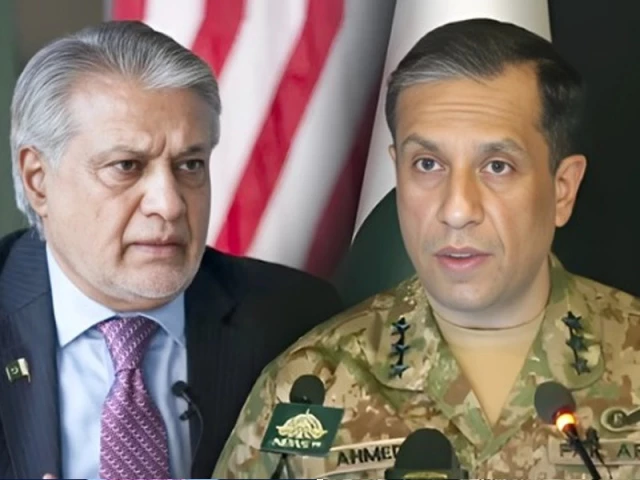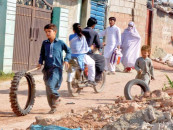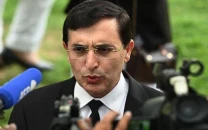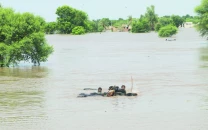DPM Dar, DG ISPR reject India's Pahalgam claims, warn of decisive response if provoked
The two held a joint presser amid rising Pakistan-India tensions following the Pahalgam attack in IIOJK last week.

Deputy Prime Minister and Foreign Minister Ishaq Dar and DG ISPR Lt Gen Ahmed Sharif Chaudhry addressed a joint press conference in Islamabad on Wednesday amid escalating tensions between Pakistan and India, following the Pahalgam attack in Indian Illegally Occupied Jammu and Kashmir (IIOJK).
DG ISPR dismantled the Indian narrative, accusing New Delhi of orchestrating a pattern of misinformation, staged provocation, and state-sponsored terrorism aimed at destabilising Pakistan and the region.
He highlighted the geographic reality of the attack, stating that the site was located deep within Indian-controlled territory, far from the nearest town of Bagh in Azad Jammu and Kashmir.
Emphasising Pakistan’s approach based on facts, he said, “If the allegation is that the Pakistan-based so-called terrorists did this incident, then you need to be cognizant of where it lies, how deep within [IIOJK]. If you see the terrain, you will see it is quite hilly, it is not the sort of terrain that is friendly and not the sort of terrain where all-weather fair roads exist. It’s mostly [four-wheelers] that travel.”
Using visuals of the region, he underscored the logistical implausibility of Indian claims. “The distance from the incident site to the nearest police station was 30 minutes,” he said, questioning how “an FIR could be registered in 10 minutes.”
Critiquing the inconsistencies in India’s account, the DG ISPR noted that while some Indian reports spoke of indiscriminate firing, others emphasised a religiously motivated act of terrorism. He suggested this contradiction indicated a pre-planned narrative.
“There you see the collusion, how the choreography is carried out: first projecting and predicting where we will strike, then the attack happens, followed by its glorification on social media,” he said. “If you observe the pattern, their electronic media jumps in within minutes. The same sequence was visible in Pahalgam.”
He said the same media choreography was seen in the past, including the bombing of the Jaffar Express. “Is it the first time it is happening? No, there is a litany of using terror incidents for political ends. This is important — these terror incidents have a political objective. We saw last time, in Pulwama, how the terror incident in February was used for … change of status of Kashmir.”
Chaudhry further accused India of using the Pahalgam incident to distract from Pakistan’s progress in fighting terrorism and stabilising its economy. “We are seeing now that a terror incident that happened in Pahalgam is being used for the purpose of IWT, distracting [from] Pakistan’s continuously and hard-fought won war on terrorism and successful efforts in reviving the economy.”
He also warned of a dangerous trend: the use of Pakistani prisoners in Indian jails for fake encounters. “We have reports, the information that hundreds of Pakistanis held in jails in different locations by India are used in fake encounters projected as terrorists and infiltrators.”
He added that following the Jaffar Express attack, the spokesperson of the banned Balochistan Liberation Army (BLA) appeared on multiple Indian news channels, glorifying the assault. “Indian media was the first to show footage of the attack that was shot by the BLA,” he noted, calling it evidence of India’s state-sponsored terrorism.
“The issue of Indian-sponsored assassinations and terrorism is transnational,” DG ISPR added. “It’s affecting Canada, the US and Australia as well.”
Justifying Pakistan’s call for a neutral investigation, he said: “Once we say that we have gotten nothing to do with Pahalgam and once we say that the only way out is an independent credible transparent investigation, we have strong reasons, empirical evidence, and facts on the basis of which we are saying this.”
He revealed fresh intelligence: “We have credible intelligence that Indians post-Pahalgam have tasked all their proxies to undertake terrorist acts everywhere in Pakistan. Whether these proxies are operating in Balochistan or other parts of Pakistan.”
Since January 2024, he said, Pakistan had experienced 3,700 terror incidents, conducted 77,816 operations, neutralised 1,666 terrorists, and recorded 3,896 casualties. “This is terrorism that is being abetted and sponsored by India. It’s for the whole world to see, they feel it, its effects. We must be cognisant that Pakistan is the last bulwark standing against this scourge of terrorism.”
Criticising India’s political motives, he stated: “For the sake of its short-term myopic objectives, it is facilitating this terrorism, it is abetting this perverted creeping ideology. Why? For short-term political objectives.”
On the targeting of Muslims post-attack, DG ISPR dismantled the narrative of Islamist terrorism, stating: “I talked earlier that there is a planned and choreographed campaign of Islamist terrorism, but the acts speak differently. This is what some sane people are saying — the tourists who came in taxis belonging to Muslims, they stayed in hotels owned by Muslims, they ate food cooked by Muslims … and after the attack, they were covered and protected by Muslims. The first person to die was Muslim.”
He raised a critical question: “Why is an effort being made to label the whole community of Indian Muslims as terrorists? Is this part of some agenda? Is it part of that hate that is being systematically put into society?”
He warned that even dissenting voices in India are being silenced. “What the Indians are trying to do is … internalisation of external problems and externalisation of internal problems. Kashmir is an external problem and they are externalising it. Terrorism and extremism are an internal problem of India. Instead of handling it, and addressing it, they are externalising it. This cycle is manifesting itself in this Pahalgam incident.”
When asked about Pakistan’s potential response, he said, “We are monitoring the situation very carefully in all terrains and accordingly, our responses and countermeasures in all domains are ready and, as you must have seen in the NSC declaration, the statement of the government that came last night as well — there will be decisive and assured actions.”
Without disclosing operational specifics, he assured: “Rest assured that the people of Pakistan, with its full resolve, will defend the territorial integrity and sovereignty of Pakistan at all costs.”
Echoing this, Dar concluded, “Pakistan will exercise restraint for the purpose of regional peace, but — and that is very clear — if provoked, any action from the other side will be responded to in a befitting manner and in a stronger way.”
Earlier in the press conference, Dar said that while “world leaders have been requesting the exercise of restraint in recent days,” Pakistan would not be the first to take an escalatory step.
“I have made it very clear, on behalf of the government and the nation, that Pakistan will not be the first one to resort to any escalatory move. However, in case of any escalatory move by the Indian side, we will respond very strongly,” he added.
Reaffirming Pakistan’s stance on terrorism, he stated: “Let me start by reiterating that Pakistan condemns terrorism in all its forms and manifestations. No cause or objective can justify taking the lives of innocent people. This is the national and Islamic policy: killing of a human being is tantamount to killing entire humanity as per the [Holy] Quran and saving a life is tantamount to saving entire humanity.”
He expressed sorrow over the attack, saying: “We are concerned over the loss of life during the Pahalgam attack. We also extend our condolences. Being a victim of terrorism itself, no one can feel the pain of those impacted by this scourge like Pakistan.”
The FM went on to condemn India's alleged role in cross-border terrorism, remarking that “India glorifies and even celebrates its assassination campaign and sponsoring of terrorism in Pakistan and other countries. No other country has sacrificed so much or suffered as much as Pakistan due to terrorism.”
He noted that Pakistan had lost over 80,000 lives and suffered over $150 billion in direct economic losses, with the total national cost amounting to $500 billion. These sacrifices, he said, have helped stabilise the region and contribute to global counterterrorism efforts.
Rejecting India's accusations over the Pahalgam attack, Dar stated: “Pakistan has been the victim of terrorism that has been planned, orchestrated and sponsored by India. It is preposterous to even suggest any kind of association of Pakistan with this [Pahalgam] incident.”
He criticised the media and political hype in India, calling it “deliberate and choreographed.” According to him, “the furore and media hype created over each and every incident in India seems to be deliberate and choreographed. It is unfortunate that India continues to weaponise unsubstantiated accusations and allegations as part of its disinformation strategy for narrow political ends.”
He further remarked, “They have done it before and resorted again to the same to what they did in the Pulwama incident,” referring to India's past accusations following attacks in Kashmir.
“It has become a very familiar template aimed at diverting attention from India’s inability to suppress the inalienable right of Kashmiris to self-determination, its security failures in [IIOJK] as well as its decades-long state terrorism and oppression,” he maintained.
Dar added that “a durable solution for India lies in focusing on its internal problems instead of pointing fingers at other countries. India has been deploying allegations of terrorism to achieve its strategic objectives for a long time,” and accused it of using terrorism claims as justification to impose “draconian laws” in IIOJK. He said this was being done in defiance of United Nations Security Council resolutions.
Highlighting the recent diplomatic and media rhetoric from India, the DPM warned: “We remain extremely concerned at the very vitriolic, highly inflammatory and blatantly Islamophobic narrative being directed against Kashmiris and Indian Muslims,” and noted that this narrative was also being directed toward Pakistan in what he called “a highly irresponsible ploy for narrow objective gains” that was pushing the entire region toward “extreme instability.”
Responding directly to India’s accusations, he said: “India made allegations against Pakistan after the Pahalgam attack without an iota of evidence and with such dramatic speed. Pakistan has nothing to do with it and we have said so right from the beginning, and I repeat: Pakistan has nothing to do with the Pahalgam incident, period.”
He reiterated Prime Minister Shehbaz Sharif’s proposal for an impartial probe, saying: “We demand an independent and transparent probe by neutral investigators, as announced by Prime Minister Shehbaz Sharif. Any TORs [terms of reference] in this regard should be credible and mutually agreed upon.”
He added, “Pakistan has neither any connection … nor is the potential beneficiary. At a time when the economy is stabilising and we are making significant progress against terrorism, we need to question why this situation is being created by India all of a sudden and what is the motivation behind it.”
Turning to India’s decision to suspend the Indus Waters Treaty (IWT), Dar said, “Holding in abeyance the Indus Waters Treaty is unilateral and illegal. There are no such provisions in the treaty, it cannot be amended or terminated without consensus and in case of disagreements or issues, there are forums provided in the treaty which should be invoked.”
He warned that the move shows India’s “blatant disregard” for international obligations and could “strike at a fundamental ill of regional cooperation with profound implications for regional and global stability.”
The FM reminded that “Pakistan is an agrarian economy, millions of people are dependent on the waters being regulated by this treaty. We gave up three rivers in this treaty and I can hardly find a water distribution treaty in the world whereby… the rivers could have also been given up.”
He warned, “The National Security Committee has made it very clear that any attempt to stop or divert the flow of water belonging to Pakistan, as per the IWT and the usurpation of the rights of the lower riparian, would be considered an act of war. It is equal to an attack on the people of Pakistan and its economy.”
On India’s recent diplomatic actions, the DPM said they were “indiscriminate and unnecessary” and described India’s rhetoric as “highly irresponsible.”
He asserted, “Being a responsible member of the international community, Pakistan believes in restraint and remains committed to regional peace and stability. However, in case of any act of aggression, Pakistan remains determined to defend its sovereignty and territorial integrity, in exercise of its inherent right to self-defence under Article 51 of the UN charter.”
Dar also raised six questions for the international community: “One, is it not time for the international community to hold India accountable for its transnational assassinations in different countries, including Pakistan? Two, is it not important to distinguish between the international community’s sympathies with the victims of the incident and the unwitting endorsement of Indian belligerence? Three, is it not that Indian propaganda is aimed at fabricating a case for military adventure? Four, don’t you think that India’s blatant disregard for international law and whimsical approach towards its obligations would lead to a highly unstable and unpredictable regional order? Five, isn’t it high time for the international community to step in and condemn India and prevent it from targeting people on the basis of Islamophobia and religious hatred? Six, can we deny that the dangerous Indian brinkmanship and efforts aimed at escalation can potentially lead to disastrous consequences in a nuclearised region and beyond?”
On the state of national readiness, he said, “We are very alert, the armed forces are alert, and the NSC resolve is very much there. We are vigilant, our armed forces are vigilant and the nation will thwart any misadventure, responding in a befitting and decisive manner at the time and place of our choosing.”
He also responded to criticism that Pakistan had not condemned the Pahalgam attack quickly: “It took no time for Pakistan to issue the statement expressing its condolences. I was with the prime minister in Ankara on an official 36-hour visit. After we landed, the news came, and the moment the meetings ended in the evening… I was in touch with the FO and the foreign secretary, and the team and I finalised in consultation with the stakeholders, Pakistan’s statement on this incident.”
Dar continued, “So don’t tell me that Pakistan has not condemned. There are different forums of condemnation. Pakistan has condemned at the international forum where it is responsible, one of the 15 members of the UNSC. Pakistan’s highest security forum, which is the NSC, has condemned it. We have condemned terrorism in all its manifestations and forms. The prime minister has given a very clear condemnation statement when he offered an independent inquiry … by independent actors. So this is rhetoric which the other side has been playing that we did not condemn, that is all wrong.”
Following his remarks, Foreign Office spokesperson Shafqat Ali Khan added that there were glaring irregularities in India’s investigation process. “The timing raises serious questions about how information was processed so quickly,” he said, referring to the speed at which Indian authorities registered the FIR and blamed Pakistan.
India has accused Pakistan of involvement without presenting any evidence. New Delhi responded with punitive actions, including suspension of the Indus Waters Treaty, visa revocations, and closure of the Wagah-Attari crossing. In turn, Islamabad expelled Indian diplomats, cancelled visas for Indian nationals (except Sikh pilgrims), and shut its side of the main border.
Information Minister Attaullah Tarar warned a day earlier that Pakistan has credible intelligence of potential Indian military action within 24 to 36 hours, labelling India’s claims “baseless and concocted.”
The DG ISPR, addressing the media a day earlier, shared what he called “irrefutable” proof of Indian state-sponsored terrorism inside Pakistan, claiming that India supplies weapons, IEDs, and explosives to militants targeting both civilians and security forces.
Despite the growing confrontation, Pakistan reiterated its denial of involvement in the Kashmir attack and offered to cooperate in a credible investigation. Defence Minister Khawaja Asif also warned the situation could spiral into a full-scale war if not de-escalated.
Meanwhile, US State Department spokesperson Tammy Bruce said Washington is urging both sides to de-escalate. “We are reaching out to both parties and telling, of course, them to not escalate the situation,” Tammy Bruce said on Wednesday.
“Secretary Rubio believes diplomacy must take the lead,” Bruce said, noting that the Secretary has also encouraged other national leaders and foreign ministers “to reach out to the countries on this issue.”
The UN has also urged both nations to exercise “maximum restraint” to avoid further deterioration.






















COMMENTS
Comments are moderated and generally will be posted if they are on-topic and not abusive.
For more information, please see our Comments FAQ